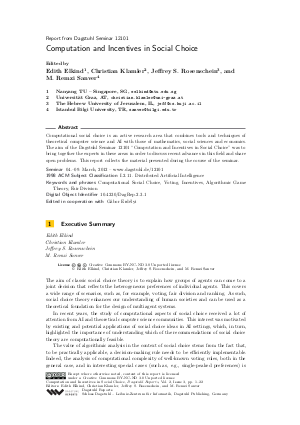Computation and Incentives in Social Choice (Dagstuhl Seminar 12101)
Authors Edith Elkind, Christian Klamler, Jeffrey S. Rosenschein, M. Remzi Sanver and all authors of the abstracts in this report
-
Part of:
Issue:
Dagstuhl Reports, Volume 2, Issue 3
Part of: Volume: Dagstuhl Reports, Volume 2
Part of: Journal: Dagstuhl Reports (DagRep) - License:
 Creative Commons Attribution-NonCommercial-NoDerivs 3.0 Unported license
Creative Commons Attribution-NonCommercial-NoDerivs 3.0 Unported license
- Publication Date: 2012-06-25
File

PDF
DagRep.2.3.1.pdf
- Filesize: 0.77 MB
- 22 pages
Document Identifiers
Subject Classification
Keywords
- Computational Social Choice
- Voting
- Incentives
- Algorithmic Game Theory
Metrics
- Access Statistics
-
Total Accesses (updated on a weekly basis)
0PDF Downloads0Metadata Views
Abstract
Computational social choice is an active research area that combines tools and techniques of theoretical computer science and AI with those of mathematics, social sciences and economics. The aim of the Dagstuhl Seminar 12101 ``Computation and Incentives in Social Choice'' was to bring together the experts in these areas in order to discuss recent advances in this field and share open problems. This report collects the material presented during the course of the seminar.
Cite As Get BibTex
Edith Elkind, Christian Klamler, Jeffrey S. Rosenschein, and M. Remzi Sanver. Computation and Incentives in Social Choice (Dagstuhl Seminar 12101). In Dagstuhl Reports, Volume 2, Issue 3, pp. 1-22, Schloss Dagstuhl – Leibniz-Zentrum für Informatik (2012)
https://doi.org/10.4230/DagRep.2.3.1
BibTex
@Article{elkind_et_al:DagRep.2.3.1,
author = {Elkind, Edith and Klamler, Christian and Rosenschein, Jeffrey S. and Sanver, M. Remzi},
title = {{Computation and Incentives in Social Choice (Dagstuhl Seminar 12101)}},
pages = {1--22},
journal = {Dagstuhl Reports},
ISSN = {2192-5283},
year = {2012},
volume = {2},
number = {3},
editor = {Elkind, Edith and Klamler, Christian and Rosenschein, Jeffrey S. and Sanver, M. Remzi},
publisher = {Schloss Dagstuhl -- Leibniz-Zentrum f{\"u}r Informatik},
address = {Dagstuhl, Germany},
URL = {https://drops.dagstuhl.de/entities/document/10.4230/DagRep.2.3.1},
URN = {urn:nbn:de:0030-drops-35322},
doi = {10.4230/DagRep.2.3.1},
annote = {Keywords: Computational Social Choice, Voting, Incentives, Algorithmic Game Theory}
}
